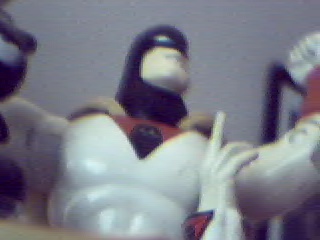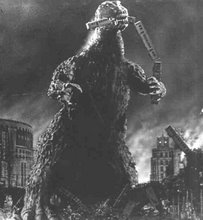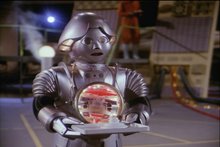World War Z: Not to be Confused with the Child Doctor of the Same Name
S.P. convinced me to try out the Blogger upgrade deal, and I went a little nuts with the automatic news article generator. On the other hand, Corythosaurus is now number 24,328 in news concerning Bigfoot, Godzilla, ninjas, pirates, robots, zombies, and of course all the news that's fit to shat with the dramatic return of Shatnews featuring popular recording artist and Emmy Award-winning actor William Shatner, not pictured here.
Speaking of zombies, I just finished Max Brooks's World War Z and can't recommend it highly enough. It's an after-the-fact oral history of a worldwide battle (natch) against the zombie hordes. And since the book is written Studs Terkel-style, it's clear the humans win the war--but it's the How that's really interesting. Brooks--Son of Mel--is quite good at leaving lingering questions about the How and keeping you turning the pages until it's 7 in the morning and you have to go to work but you just have to get to the end of the chapter and maybe your boss will believe you really do have the flu this time and--
I digress. Some reviews I've read claim "nothing unusual" happens, or that it's just a "typical zombie story" told from multiple perspectives. And that's just silly. Mind you, it does seem like one of those things that immediately makes you wish you'd thought of it, one of those things you'll kick yourself for not thinking of before Brooks did. And sure, there are some awkward bits of dialogue--though they are surprisingly few. And at times the way Brooks describes real people in his book without ever naming names (including, but not limited to: Howard Dean, Colin Powell, Paris Hilton, and either Nelson Mandela or Desmond Tutu, if I'm guessing right) gets a little overdone. Especially odd considering that at one point a veteran soldier of Brooks's zombie war recollects finding himself in the line of battle beside Michael Stipe. But those are minor annoyances in what's probably the most comprehensively considered analysis of a "real-world" zombie apocalypse I've ever read. This isn't just a band of people holed up in a mall, house, or even a tower. There are individual stories that hit upon those old chestnuts in creative new ways, but what emerges is a lot more than that. It's got a little Ender's Game going on--the war planning and strategy, the threat of certain annihilation--and at times the apocalyptic angle really called to mind Battlestar Galactica as well. If you haven't read it, pick up a copy. In hardback. If you don't, you won't be able to be a big, fat know-it-all when the movie comes out. So many things no one in the movies ever thinks about: how do you retake a place the size of the U.S. away from millions upon millions of zombies? Can islands or water really protect you from things that don't need to breathe? Whither toilet paper and donuts? How long does it take a zombie to walk from China to Japan across the ocean floor?
The audiobook is also a wonder: the cast includes Mark Hamill, Henry Rollins, Alan Alda, both of the Reiners, and the proverbial "a lot more." Unfortunately, it covers maybe half of the actual printed book, so I say get 'em both. You don't want to miss Rollins as the private security contractor at home of the Last Celebrities On Earth, but you don't want to miss Siberian zombie wars or fighting the armies of undead in the foul sewers of Paris.
Finally, while I haven't dug into it just yet, it's worth nothing that World War Z is a sequel of sorts to the Zombie Survival Guide, which is played very straight as a non-fiction "civilian safety manual." Personally, I'd read Z first and the manual second--more surprises that way.
Thanks, Max Brooks, you magnificent bastard. As a writer I do wish I'd thought of it first, but as a reader I'm much happier that you did.












No comments:
Post a Comment